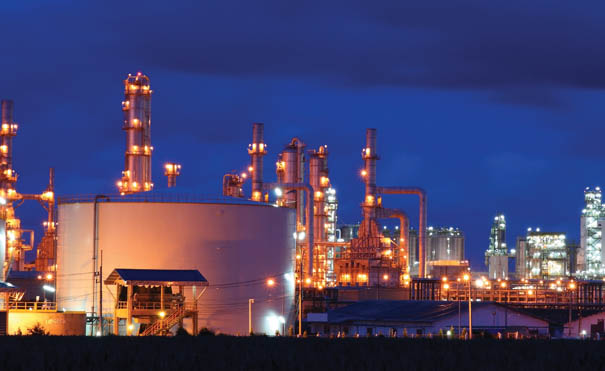Treating industrial wastewater is both costly and challenging. Effluent liquids or slurries from petrochemical plants typically comprise excessive levels of suspended particulates, volatile organic compounds (VOCs), and heterogeneous fluids.
These may be abrasive or corrosive in nature and can significantly impact the performance of processing or process monitoring equipment. Contact level sensors, for example, may become fouled by one or more constituents in the measured media, resulting in a significant rise in measurement inaccuracies.
API oil-water separators are one of the fundamental components used in wastewater treatment for petrochemical facilities such as oil refineries and natural gas processing plants. They operate on the principle of Stokes’ law, separating the constituent parts of complex emulsions based on their density and size. Suspended solids typically sediment and sink to the bottom of the separator while oils rise to the surface. The fluid content is then separated and discharged into separate storage tanks; the volumes of which are monitored using one of several level sensor technologies.
The limitations of conventional level sensor technologies
Conventional level sensors are limited for application in API oil-water separators due to their operating principles, which typically measure fluid levels as a function of either buoyancy or relative to the dielectric constant of the measured media. Buoyancy level sensors can be problematic as they make no contingencies for retentate media that has built-up on vessel walls. This can adversely skew level measurements and lead to measurement errors. The same could be argued of magnetic level sensors.
Innovative level sensors operating on the principles of laser time-of-flight analysis have revolutionized process control for API oil-water separators. Elimination of maintenance requirements, improved measurement accuracy, and reliable detection of liquids irrespective of their dielectric constant are just a few of the benefits offered by laser level sensors.
LLT100 laser level sensor for API separator storage vessels
The LLT100 is an advanced laser level sensor that can be installed into API separator storage tanks without prior silo mapping. It is equipped with a narrow laser beam (905nm) that can be aimed with high-precision, removing false echoes from the measuring process which typically arise from local variations on nearby structures. This is further supported by the small diameter interface of the level sensor’s collecting lens, which is integrated into a compact housing approved for use in explosive conditions.
This unique laser level sensor is available as three distinct options:
- An affordable yet powerful base level transmitter suitable for a wide range of applications;
- A high-pressure level sensor fitted with a choice of pressure rated flanges;
The high-pressure-rated model is ideal for use in API separators and resultant storage vessels. It provides accurate, real-time measurements of liquid volumes to an accuracy of within 11mm, using a combination of advanced laser pulses, efficient detection, and integrated calculations. These are unaffected by the dielectric constant of the measured fluid, or the presence of retentate media on the vessel walls.
Laser level sensors from ABB
ABB is a global leader in the development and supply of advanced level measurement technologies for demanding industrial processes. ABB laser level sensors are suitable for accurate measurements of demanding process media, with considerations for harsh measuring conditions.




